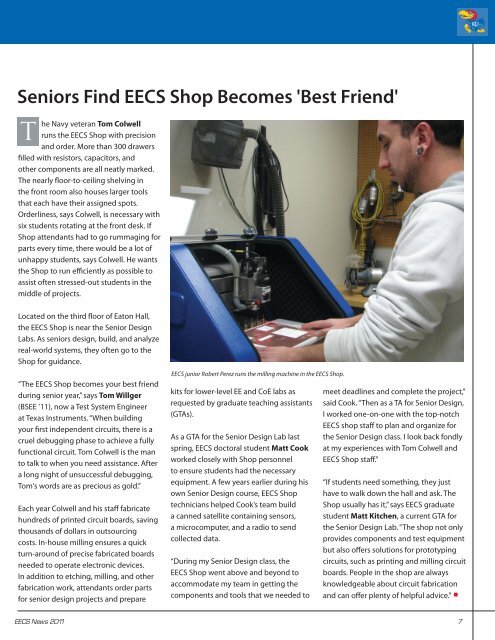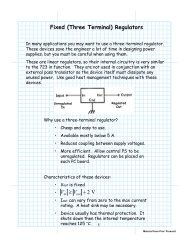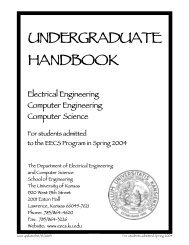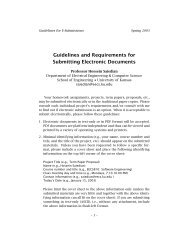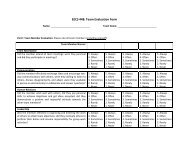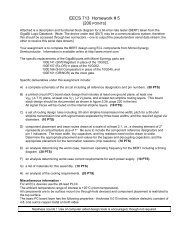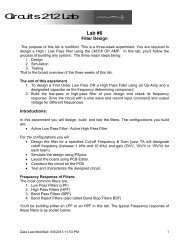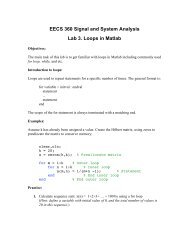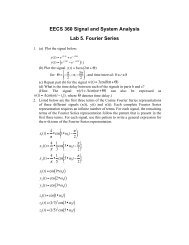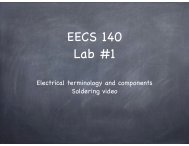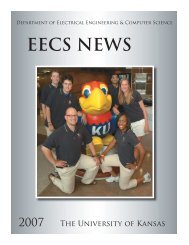2011 Edition - Electrical Engineering and Computer Science - The ...
2011 Edition - Electrical Engineering and Computer Science - The ...
2011 Edition - Electrical Engineering and Computer Science - The ...
- No tags were found...
You also want an ePaper? Increase the reach of your titles
YUMPU automatically turns print PDFs into web optimized ePapers that Google loves.
Seniors Find EECS Shop Becomes 'Best Friend'<strong>The</strong> Navy veteran Tom Colwellruns the EECS Shop with precision<strong>and</strong> order. More than 300 drawersfilled with resistors, capacitors, <strong>and</strong>other components are all neatly marked.<strong>The</strong> nearly floor-to-ceiling shelving inthe front room also houses larger toolsthat each have their assigned spots.Orderliness, says Colwell, is necessary withsix students rotating at the front desk. IfShop attendants had to go rummaging forparts every time, there would be a lot ofunhappy students, says Colwell. He wantsthe Shop to run efficiently as possible toassist often stressed-out students in themiddle of projects.Located on the third floor of Eaton Hall,the EECS Shop is near the Senior DesignLabs. As seniors design, build, <strong>and</strong> analyzereal-world systems, they often go to theShop for guidance.“<strong>The</strong> EECS Shop becomes your best friendduring senior year,” says Tom Willger(BSEE ’11), now a Test System Engineerat Texas Instruments. “When buildingyour first independent circuits, there is acruel debugging phase to achieve a fullyfunctional circuit. Tom Colwell is the manto talk to when you need assistance. Aftera long night of unsuccessful debugging,Tom's words are as precious as gold.”Each year Colwell <strong>and</strong> his staff fabricatehundreds of printed circuit boards, savingthous<strong>and</strong>s of dollars in outsourcingcosts. In-house milling ensures a quickturn-around of precise fabricated boardsneeded to operate electronic devices.In addition to etching, milling, <strong>and</strong> otherfabrication work, attendants order partsfor senior design projects <strong>and</strong> prepareEECS junior Robert Perez runs the milling machine in the EECS Shop.kits for lower-level EE <strong>and</strong> CoE labs asrequested by graduate teaching assistants(GTAs).As a GTA for the Senior Design Lab lastspring, EECS doctoral student Matt Cookworked closely with Shop personnelto ensure students had the necessaryequipment. A few years earlier during hisown Senior Design course, EECS Shoptechnicians helped Cook’s team builda canned satellite containing sensors,a microcomputer, <strong>and</strong> a radio to sendcollected data.“During my Senior Design class, theEECS Shop went above <strong>and</strong> beyond toaccommodate my team in getting thecomponents <strong>and</strong> tools that we needed tomeet deadlines <strong>and</strong> complete the project,”said Cook. “<strong>The</strong>n as a TA for Senior Design,I worked one-on-one with the top-notchEECS shop staff to plan <strong>and</strong> organize forthe Senior Design class. I look back fondlyat my experiences with Tom Colwell <strong>and</strong>EECS Shop staff.”“If students need something, they justhave to walk down the hall <strong>and</strong> ask. <strong>The</strong>Shop usually has it,” says EECS graduatestudent Matt Kitchen, a current GTA forthe Senior Design Lab. “<strong>The</strong> shop not onlyprovides components <strong>and</strong> test equipmentbut also offers solutions for prototypingcircuits, such as printing <strong>and</strong> milling circuitboards. People in the shop are alwaysknowledgeable about circuit fabrication<strong>and</strong> can offer plenty of helpful advice." •EECS News <strong>2011</strong> 7


